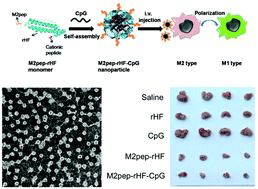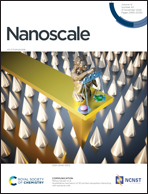Targeted ferritin nanoparticle encapsulating CpG oligodeoxynucleotides induces tumor-associated macrophage M2 phenotype polarization into M1 phenotype and inhibits tumor growth†
Abstract
Tumor-associated macrophages (TAM) are primarily of the M2 type that facilitates tumor growth, metastasis, and immunosuppression. Therefore, repolarizing the TAMs to the pro-inflammatory M1 type is a promising therapeutic strategy against cancer. Toll-like receptor (TLR) agonists like CpG oligodeoxynucleotides (CpG ODNs) can induce anti-tumor macrophages, however, their applications in vivo are limited by the lack of effective delivery approaches. Naked CpG ODNs fail to penetrate cell membranes and are easily cleared by nucleases, which can potentially trigger an inflammatory response in serum by systemic administration. Nanoparticles can deliver TLR agonists to the target TAMs following systemic administration and selectively accumulate in tumors and macrophages, and eventually trigger TLR signaling and M1 polarization. In this study, we developed a nanoparticle vector for the targeted delivery of CpG ODNs to M2 type TAMs by encapsulating the CpG ODNs inside human ferritin heavy chain (rHF) nanocages surface modified with a murine M2 macrophage-targeting peptide M2pep. These M2pep-rHF-CpG nanoparticles repolarized M2 TAMs to the M1 type and inhibited tumor growth in 4T1 tumor-bearing mice after intravenous injection. Furthermore, M2pep-rHF-CpG also reversed the phenotype of cultured human macrophages in vitro. Interestingly, the empty M2pep-rHF nanoparticles lacking CpG ODNs also exhibited anti-tumor ability. Taken together, M2pep-rHF nanoparticles offer a novel anti-cancer therapeutic strategy via targeted delivery of CpG ODNs to M2 type TAMs, and M2pep-rHF-CpG or M2pep-rHF nanoparticles may become promising medicines for tumor immunotherapy.



 Please wait while we load your content...
Please wait while we load your content...